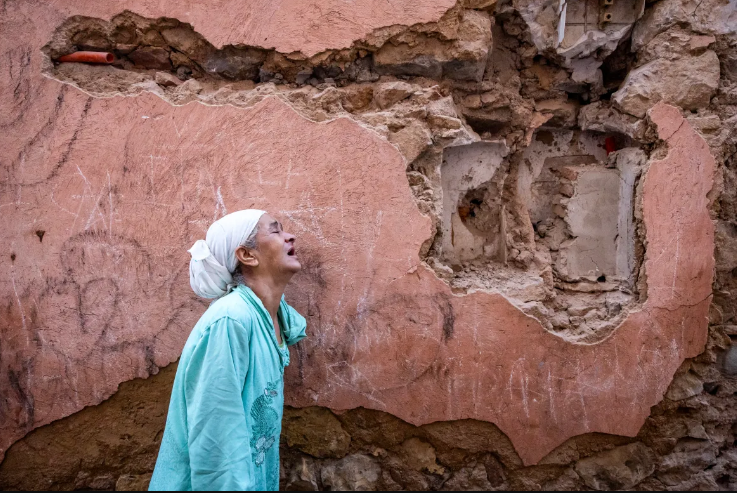DM Monitoring
Marrakesh: Moroccans on Sunday mourned the victims of a devastating earthquake that killed more than 2,000 people, as rescue teams raced to find survivors trapped in the rubble of flattened villages.
The strongest-ever quake to hit the country has killed at least 2,012 people and injured over 2,059, many of them critically, according to the latest official figures.
Friday’s 6.8-magnitude quake struck 72 kilometres southwest of the tourist hub of Marrakesh, wiping out entire villages in rural areas. The World Health Organisation said more than 300,000 people were affected in Marrakech and surrounding areas.
“I’ve lost everything”, said Lahcen, a resident of the mountain village of Moulay Brahim, whose wife and four children were killed.
Rescue workers recovered the bodies of Lahcen’s three daughters from the rubble of what was once their home, but have not yet found the bodies of his wife and son. “I can’t do anything about it now, I just want to get away from the world and mourn.”
Troops and emergency services have scrambled to reach remote mountain villages where victims are still feared trapped.
In the village of Amizmiz near the epicentre, rescue workers picked through rubble with their bare hands. Fallen masonry blocked narrow streets. Outside a hospital, around 10 bodies lay covered in blankets as grieving relatives stood nearby.
“When I felt the earth shaking beneath my feet and the house leaning, I rushed to get my kids out. But my neighbours couldn’t,” said Mohamed Azaw. “Unfortunately no one was found alive in that family. The father and son were found dead and they are still looking for the mother and the daughter.”
Rescuers stood atop the pancaked floors of one building in Amizmiz, bits of carpet and furniture protruding from the rubble. A long queue formed outside the only open shop as people sought supplies. Underlining the challenges facing rescuers, fallen boulders blocked a road from Amizmiz to a nearby village.
Al-Haouz province, where the epicentre of the earthquake was located, suffered the most deaths with 1,293, followed by the province of Taroudant with 452.
Nearly all the houses in the area of Asni, some 40 km south of Marrakech, were damaged, and villagers were preparing to spend the night outside. Food was in short supply as roofs had collapsed on kitchens, said villager Mohamed Ouhammo.
Montasir Itri, a resident of Asni, said the search was on for survivors. “Our neighbours are under the rubble and people are working hard to rescue them using available means in the village,” he said.
The village of Tansghart in the Ansi area, on the side of a valley where the road from Marrakech rises up into the High Atlas. Its once-pretty houses, clinging to a steep hillside, were cracked open by the shaking ground. Those still standing were missing chunks of wall or plaster. Two mosque minarets had fallen.
Abdellatif Ait Bella, a labourer, lay on the ground, barely able to move or speak, his head bandaged from wounds caused by falling debris.
“We have no house to take him to and have had no food since yesterday,” said his wife Saida Bodchich, fearing for the future of their family of six with their sole breadwinner so badly hurt. “We can rely on nobody but God.”
First funerals
Bouchra, another resident of Moulay Brahim, dried her tears with her scarf as she watched men digging graves to bury the victims.
“My cousin’s grandchildren are dead”, she said in a knotted voice.
“I saw the devastation of the earthquake live, and I’m still shaking. It’s like a ball of fire that has swallowed up everything in its path,” she said.
“Everyone here has lost family, whether in our village or elsewhere in the region,” she added.
Fatema Satir, a resident in Marrakesh, told many were sleeping in the street for fear of their houses collapsing.
“Look where all these people are sleeping. There is no help for us, our houses have been cracked, others destroyed like my daughter’s house, which was wiped out. We are in a chaotic state.”
Authorities declared three days of national mourning, while several countries, including Israel, France, Spain, Italy and the United States, have offered aid.
Neighbouring Algeria, which has had rocky relations with Morocco, opened its airspace, which had been closed for two years, to flights carrying humanitarian aid and the injured.
‘Years of aid’
The Red Cross warned that it could take years to repair the damage.
“It won’t be a matter of a week or two… We are counting on a response that will take months, if not years,” Hossam Elsharkawi, the organisation’s Middle East and North Africa director, said in a statement.
The village of Tafeghaghte, 60km southwest of Marrakesh, was almost entirely destroyed by the quake, the epicentre of which was only about 50 kilometres away, an AFP team reported, with very few buildings still standing.
“Three of my grandchildren and their mother are dead,” said 72-year-old Omar Benhanna. “They’re still under the debris. It wasn’t so long ago that we were playing together.”
Residents buried around 70 victims in the nearby cemetary on Saturday, as the funeral rites were punctuated by cries and screams.
In the evening, television channels broadcast aerial images showing entire villages of clay houses in the Al-Haouz region completely destroyed.
“The public authorities are still mobilised to speed up rescue operations and evacuate the injured,” the interior ministry said on Saturday evening.
The Moroccan armed forces will deploy rescue teams to provide affected areas with clean drinking water, food supplies, tents and blankets, the royal court said.
The tremor was also felt in the coastal cities of Rabat, Casablanca, Agadir and Essaouira, where many panicked residents took to the streets in the middle of the night, fearing that their homes would collapse.
This earthquake is the deadliest in Morocco since the 1960 quake that destroyed Agadir, in which more than 12,000 people, about a third of the city’s population at the time, died.
Marrakech is due to host the annual meetings of the International Monetary Fund (IMF) and World Bank from October 9.
An IMF spokesperson, asked about the planned meetings, said: “Our sole focus at this time is on the people of Morocco and the authorities who are dealing with this tragedy.”




